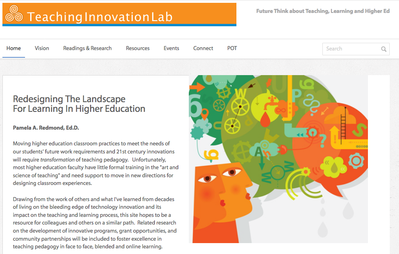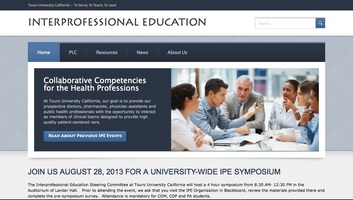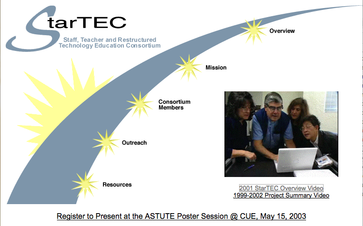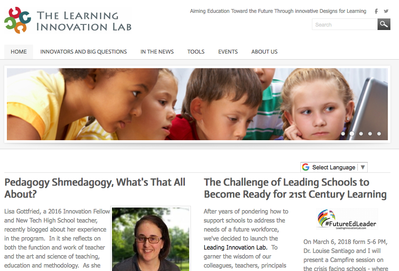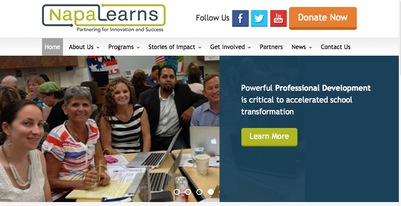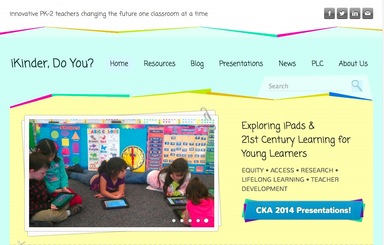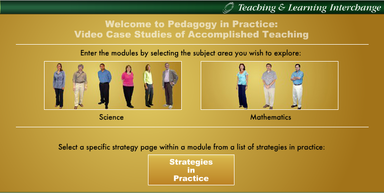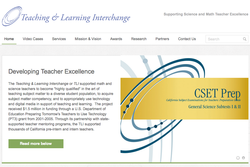The Innovation Labs - Teaching, Learning and Leading for the 21st Century
The links below partially represent a body of work I've grown since 2001. The activities on the left were designed for university-wide faculty development and, in the case of the StarTEC grant, specifically teacher education faculty. This project alone impacted over 100 preservice teacher programs in California and thousands of preservice and inservice teachers across the state. The right side of this page provides a glimpse into teaching, service and research dives I've taken while re-thinking the meaning of classroom and the effects digital media, technology, and learning redesign can have on teaching practices and learner growth.
University Faculty Development
The Teaching Innovation Lab portal focuses on transformative faculty andragogy to meet the needs of the future workforce and 21st century innovations aligned with a mission for excellence in educating our future professionals. The site addresses research and development of innovative programs at including the development of grant opportunities and community partnerships. It documents trainings and explorations in teaching andragogies for face to face, blended and online learning. It is a living aggregation that grows as colleagues and other professional dive into rethinking their university-based classroom practices.
Originally conceptualized as The Center for Innovative Learning and Teaching (CILT) the project was conceptualized while a faculty member in the the Graduate School of Education at Touro University California to support the university and wider community. The goal of interprofessional education is to provide prospective medical professionals, doctors, nurses, pharmacists, physician assistants and public health professionals with the opportunity to interact as members of clinical teams designed to provide high quality patient-centered care. The design of the university-wide IPE activities involved dozens of professors across the disciplines and over 600 students, several times per year.
In 2001, this California Commission on Teacher Credentialing (CCTC) project asked, What will pre-service teacher preparation in California look like in the 21st Century? What role will technology play in the teaching and learning process in both the k-12 and higher education classroom? The CCTC partnered with 6 higher education institutions to investigate these questions. The California State Universities at Bakersfield, Fresno, and Chico along with the University of California at Riverside, University of San Francisco and Notre Dame de Namur University played a significant role in answering these questions through the Staff Teacher and Restructured Technology Education Consortium or STARTEC project.
Partner institutions were chosen because they represented diversity in terms of leadership capacity, size of faculty, cultural representation, number of candidates served, on site support and expertise and available resources, models of supervision, and program design. The project supported development of models for institutional strategies to comply with California’s new technology standard for teacher preparation programs at each of our distinct partner institutions. Across the country, more than 2 million K-12 teachers must be recruited in less than 10 years, and these future teachers need to be technology proficient. From the Resources page: A Sampling of Resources and Reports |
K12 Teacher & School Leaders Development
The Learning Innovation Lab hosts the capstone projects of over 130 teachers who have committed to a year-long immersion process to help them re-design learning experiences for students. Each Innovation Fellow is asked to use design thinking and action research to investigate an essential or driving question and need-to-knows while creating multiple learning experience prototypes for addressing the problem. Along the way we move fellows from classroom practitioner thinking to researcher to teacher-leader. Each fellow is expected to make their work visible through the LIL site and to lead fellow educators at their site, district or county level to learn about their process and solutions. To date, one out of three graduates of this innovative program moves on to a leadership position - moving into principalship, teacher on special assignment, PLC leader, district curriculum mentor, etc.
At SXSWedu 2018, my colleague Louise Santiago and I launched the first step toward development of a Leading Innovation Lab. The #FutureEdLeader @FutureEdLeader project was created to address a pernicious problem in schools: Lack of IT and Administrative vision for the needs of a future workforce and how to grow those leaders. The Leading Innovation Lab will garner the wisdom of our colleagues, teachers, principals and other administrators along with engaged business partners, parents, and higher education professionals. We are launching a research study to collect information as to what is needed to develop future-ready leaders. The NapaLearns board and district partners collaborate with the Touro Graduate School of Education staff to design curriculum that prepares teachers for the 21st century learning approaches happening in Napa County schools, including project-based learning, personalized digital curriculum and assessment, and use of digital tools and resources. Graduates of the program meet ISTE and State Technology Standards for Teachers. As part of their program, each teacher is required to investigate a district, school, or classroom problem and create a capstone project that gives back to their district and to NapaLearns by sharing research on the effectiveness of technology-enhanced learning, creating a model for others to follow, or producing teacher development materials that others can use. By 2015 45% of the Fellows had been promoted to leadership positions!
“What sets Touro apart from other Masters programs,” says Sergio V., a seasoned PBL teacher and 2012 graduate of the program who is former director of Innovation for NapaLearns, “is the exceptional overall experience. While other programs are all about the end result, Touro is also about the journey.” A collaboration of early learning teachers dedicated to closing achievement gaps in literacy for early learners by leveraging iPads and apps to immerse them in both expressive and receptive language. The Digital Early Literacy research project is shared in the presentations archived herein.
To address the critical shortage in the areas of math and science, the Pedagogy in Practice site provides online video case studies of accomplished teaching appropriate for teachers at any stage of professional development. Designed by teachers for teachers, case studies capture new and accomplished teachers and their methods for supporting and engaging students, managing day-to-day classroom activities, and making subject matter accessible. Lessons model the use of digital technologies and strategies for assessing student performance along with accommodations for English Learners and special needs. Each case shares a teacher's instructional dilemma, reflections and lessons in general science, biology, chemistry, physics, algebra and geometry classrooms at the middle and high school levels. The cases are supported by over 200 downloadable strategy materials and an online library of additional resources.
The Teaching & Learning Interchange supported math and science teachers to become "highly qualified" in the art of teaching subject matter to a diverse student population, to acquire subject matter competency, and to appropriately use technology and digital media in support of teaching and learning.
Video Case Studies of Accomplished Teaching: CSET Preparation Material Archive: csetprep.org Online CSET Course content example: CSET General Science Preparation Book: PDF |

